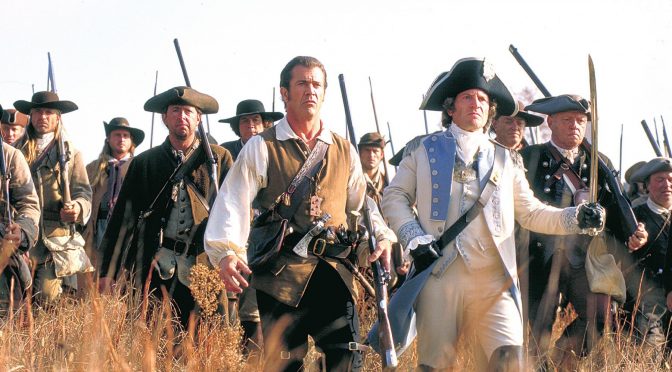Success can be a curse sometimes. In creative endeavors, a tremendous success can overshadow subsequent artistic accomplishments. Within Christendom, Mel Gibson may be most frequently associated with The Passion of the Christ. In the secular world, however, his zenith of success (as both director and actor) was Braveheart in 1995. It was such a blockbuster that a following tour de force, 2000’s The Patriot, is often wrongly compared to it, and unjustly slept on.
Although the two films share at least one theme, The Patriot is its own movie and was not intended to resemble Braveheart.
I had opportunity to re-watch The Patriot recently and was struck first by what a masterpiece of filmmaking it is. After that, what most surprised me was how much it enthralls today’s younger generations. Homelanders, who are hard to convince that anything which occurred before acquiring their first smart device could possibly be important, assume the American War of Independence took place in 1976 and the Civil War involved Martin Luther King. But this movie resonates with them, and it’s possible they might just learn something about America’s history from watching it.
DIRECTION/ACTING:
Director Roland Emmerich previously enjoyed summer blockbuster success with the alien invasion flick Independence Day. In this production, he did not tweak Robert Rodat’s screenplay, which was the right call.
Emmerich coaxed believable and nuanced performances out of most of the cast. One exception was Lisa Brenner as Anne Howard (Gabriel’s love interest). I don’t know what else she’s done or how well she did it, but for whatever reason her delivery just doesn’t strike me as invested or believable. Gibson and Heath Ledger (playing his oldest son, Gabriel) however, are dynamite in their respective roles. Ledger, especially, excels in the scenes calling for understated performances.
The opening sequence is perhaps oversold. We know Benjamin Martin’s (Gibson) sons are excited to receive mail, but it smells like the director and cast getting high on their own supply–which can be a pitfall for any group inside a creative bubble.
The film score is not catchy or especially memorable, but is competent and adequate, accentuating suspense and action scenes just as much by what it doesn’t do as by what it does. Emotional scenes are where it is most obvious, walking the line between powerful and sappy.
THEMES:
What this film shares with Braveheart, thematically, is the desire for freedom. In both films it remains mostly an abstract concept. In The Patriot, the importance of freedom is accentuated by the lack thereof, depicted in the abuse of power by William Tavington (Jason Isaacs), commander of “the Green Dragoons.”
Tavington murders prisoners of war, terrorizes civilians by burning down their homes, and forcefully conscripts freedmen into His Majesty’s service. Put another way, he represents a system that doesn’t recognize natural rights to life, liberty or property.
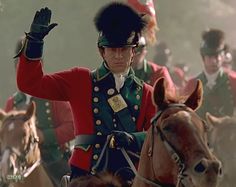
Similarly, the yearning for liberty manifests by implication through the character of Occam (Jay Arlen Jones), a slave who is sent to fight in his owner’s stead. There are no scenes of his life as a slave or his treatment, but all Americans have grown up hearing the stories and there really is no need to rehash the injustice of human beings treated as beasts of burden to be bought, sold, and “owned.”
At one point, Gabriel follows his father into a Rebel encampment and finds an abandoned American flag on the ground. It is faded, tattered, torn and threadbare–much like our republic (for which it stands) currently is. Gabriel picks it up. An exhausted, cynical fellow American tells Gabriel, “It’s a lost cause.”
This is a double (perhaps triple or quadruple) entendre. That sentiment surely was present during our country’s fight for independence, after a string of defeats against the world’s most powerful empire. It is also in sync with the “black pill” sentiment of today, as we are on the brink of losing our American birthright forever. Is freedom worth fighting for, even when the odds look impossible? When it looks like a lost cause?
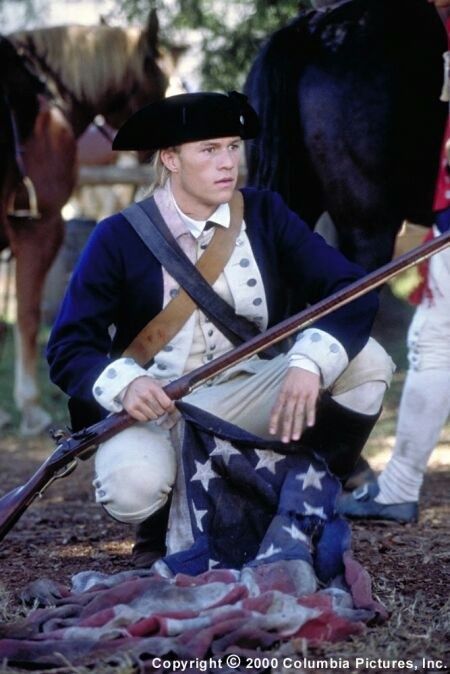
In one of those understated, nuanced performances I mentioned before, Gabriel stubbornly keeps the flag and tucks it into his satchel, to be repaired, turning his back to his black-pilling countryman.
In subsequent scenes, during downtime in bivouac, Gabriel faithfully works to repair the flag. In one notable such scene, Gabriel has a brief conversation with Occam. “People call this the New World; but it’s really the same as the old one,” opines Gabriel. But they’ve got a chance to build a new world, he continues–a world where a man’s rights are protected regardless of who his parents or ancestors are. His rights are recognized simply because he was endowed them by our Creator. And while he pontificates on his vision for a new world where freedom is the rule (not the exception) the camera moves in close on Gabriel’s hands sewing that tattered flag back together.
Later, Benjamin finds the flag his son had repaired. Benjamin was forced to join the conflict. He fights for revenge and for what’s left of his family. Gabriel, however, fights for the cause (independence and freedom). Benjamin will later proclaim that his son was the better man.
Late in the film, having made peace with the French military advisor who served as something of a minor antagonist for most of the movie, Benjamin signifies their new frendship by exclaiming, “Vive le France!”
Major Jean Villeneuve (Tchéky Karyo) responds by reminding Benjamin what the struggle for independence (and America itself) is all about: “Vive la liberté!”
When Benjamin rides out to join the American force marching to meet the British for the climactic battle, he flies the flag that his son restored. The Rebels cheer. Benjamin has transformed from a farmer fighting for personal (perhaps selfish) and immediate motives, into a patriot. He now fights for the Cause, so his countrymen and progeny will enjoy the blessings of liberty long after he is gone.
It’s doubtful that screenwriter Rodat had studied generational theory, but The Patriot is in harmony with it nonetheless.
The American War of Independence was our republic’s first fourth turning–the historical winter season of the saeculum. The Nomads serve as the tough, brutal field commanders who lead the young, collegial Heroes into battle, and to victory.
Benjamin Martin would have been from the Liberty Generation (Nomad archetype). He cut his teeth in the French & Indian War (as did George Washington), and carries even to the film’s present day a suppressed savagery to rival that of the Native warriors he fought both alongside and against. This is symbolized by the Cherokee tomahawk he has kept hidden away in his old war chest. When he joins the fight against the British, he digs the tomahawk out of storage and proves that he still knows how to use it with deadly expertise, despite not wanting to.
Son Gabriel is Republican Generation (Hero archetype) and demonstrates his cohort’s peer personality perfectly. He is confident, optimistic, a team player, altruistic, self-sacrificial, eager to marry and start his own family.
Gabriel may not appreciate enough what a barbaric business war is, but his younger brothers are even more naive. Thomas’ pastime is painting lead figurines of soldiers, fears that the war may be over before he is old enough to fight in it, and breaks into his father’s war chest to examine the souvenirs. He poses in front of the mirror wearing his father’s old uniform jacket, with the aforementioned tomahawk. Thomas will learn the hard way that war is not a game and there’s nothing romantic about it.
CHARACTERS:
Benjamin Martin is a reluctant hero from the classic mold, but with no small measure of tragedy in his life both before and during the story. A widowed farmer with seven children, he aspires to build furniture and forget the violence of his past. He both witnessed and committed atrocities fighting on the British side in the French & Indian War. He wants to avoid war at any cost not just to protect his family, but because he fears the bloodthirsty savage within himself, which awakens in the heat of battle. It makes sense why, in this “hero’s journey,” he rejects the first “call to adventure.”
Gabriel Martin has a lot of his dead mother’s personality in him, we are told. Like his mother, presumably, he serves as the voice of conscience to counterbalance the wild, barbaric warrior side of his father. He is the Robin to Benjamin’s Batman–a calming influence that motivates Benjamin to be a better example, to remind him of what he should and should not be fighting for (the Cause, or revenge?) and that good men are as quick to show mercy as they are to rage against injustice.
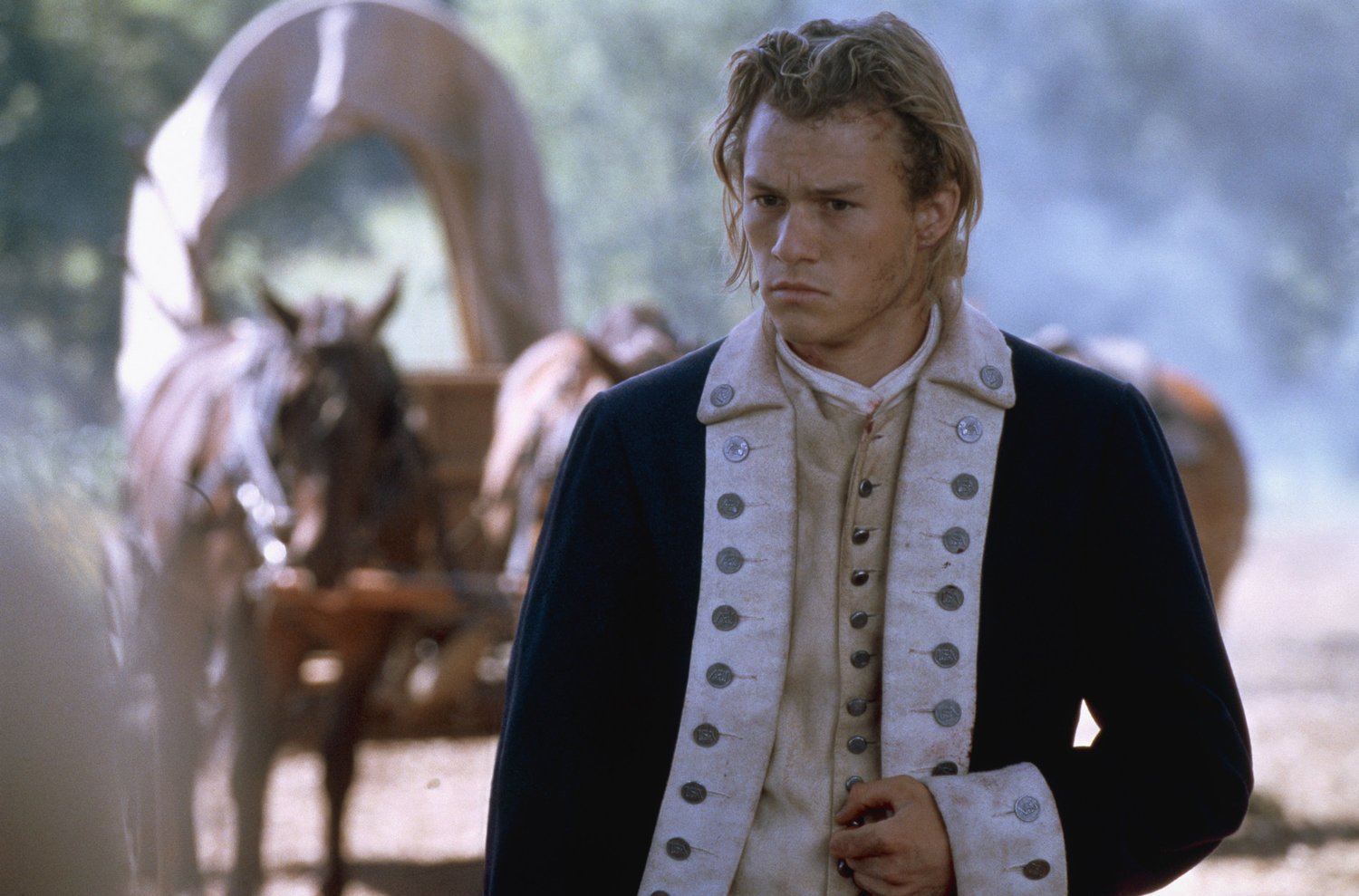
Aunt Charlotte is a little undeveloped. Sister of Benjamin’s dead wife, he and she have feelings for each other, but it’s handled so subtly that when their passions come to the surface, it seems almost that the romance came out of nowhere.
Major Villeneuve is technically an ally; but there is bad blood between him and Benjamin. In the last war they fought on opposite sides. Benjamin is infamous for an atrocity he committed against the French at Fort Wilderness. A personal vendetta against the British is what drives Villeneuve in this war. He and Benjamin have similar motives for fighting this war, but that alone is not enough for them to bury the hatchet (no pun intended).
William Tavington comes from an esteemed British noble family, but his father squandered his inheritance. So Tavington’s career, reputation, and future rest solely upon his victories in battle. This is offered as the excuse for his brutal war crimes. As in many epic tales, this villain is like a dark reflection of the hero. Benjamin Martin may have turned out identical to William Tavington, without the civilizing influence of his wife and children.
General Cornwallis is portrayed as a preening military genius, whose pride is his downfall. He knows better than to do and allow what he does, but his ego clouds his judgment. Otherwise, he could have been a civilizing influence on Tavington and, so far as this narrative goes, dealt Washington and the Continental Army a decisive defeat.
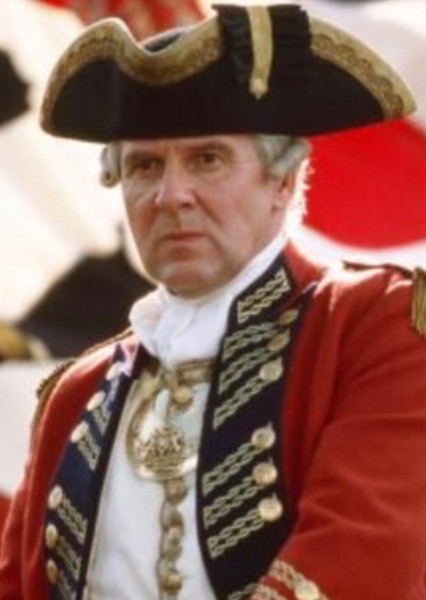
I’m commenting on Dan Scott (Donal Logue) and Occam together because they represent the duality of young America. Occam stands in for one of our founding principles: that all men are endowed by our Creator with certain unalienable rights, to include life, liberty, and the pursuit of happiness. Dan Scott only agrees to fight for the Cause after being shamed into it by Anne Howard; but clings to his prejudice against Occam. He is offended to be serving with a slave, distrusts him, and views Occam, at best, as a target for ridicule.
“What in the hell you gonna do with freedom?” Scott sneers at Occam at one point, implying he’s too stupid (maybe even subhuman) to enjoy life, liberty, and the pursuit of happiness.
The discrepancy these two characters signify is not a trivial skeleton in the American closet. Just one saeculum after our War of Independence (IOW the next fourth turning) over half million Americans would die fighting each other to resolve the contradiction.
Dan Scott, who begins the story as one of the least admirable men, has the most distinct character arc (next to the protagonist himself).
These two characters star in a subplot that is poignant and touching, even after all the race hustling and identity politics that unraveled what racial harmony America once enjoyed. That unraveling started just eight years after the release of this film, though today it seems to have been going on forever.
HISTORICAL CONSIDERATIONS:
Speaking of slavery and race relations…
The War of Independence erupted in Massachusetts. After Lexington and Concord, other northern colonies joined with them. But even with all 13 colonies fighting, it was still an unlikely long shot against the world’s greatest empire. It might have been impossible without the southern colonies.
The leadership of those southern colonies were not willing to give up their slaves. A compromise was reached: the southern colonies would join in the War for Independence, if they were allowed to pass and follow their own laws as states in the Union–including laws regarding the institution of slavery.
South Carolina was one of those southern colonies, and where The Patriot is set. In an early scene, Benjamin Martin takes his family to Charleston, SC, where an assembly has been called. Eight colonies have already joined the rebellion against the British Empire. Patriots and loyalists gather to debate as to whether South Carolina will be the ninth.
Once all arguments are heard, the South Carolina assembly votes for a levy to form a Continental Army–in effect, a declaration of war.
Benjamin Martin eventually becomes a brevet colonel of volunteers. Both the strengths and weaknesses of militia fighting against a force of professional soldiers is highlighted throughout the movie. The Minutemen perform well under fire when using guerrilla tactics. But they and the Continentals get their teeth kicked in when they meet British regulars in the open field fighting in mass formations, European-style.
Benjamin Martin is loosely based on “the Swamp Fox,” Francis Marion, plus other Americans who fought the British. But spergs can pick this film apart for the creative license taken with historical facts.
What historical movie could not be picked apart for its inaccuracies?
IN CONCLUSION:
Realism (or lack thereof) notwithstanding, The Patriot is a brilliant film. It might piss off British apologists/anglophiles/modern day British loyalists, but its overall message and supporting themes speak to the heart of an American. Including young Americans.
It’s been long enough that Braveheart no longer casts such a long shadow. With the MAGA movement uniting people across multiple demographic demarcations, now may be the perfect time to rediscover this film and let it shine.
IN OTHER NEWS:
Today, the Black Friday Based Book Sale begins. My novel Tier Zero will be discounted to 99 cents for the sale at Amazon and all other E-Book stores. I’m probably crazy for doing this, but my entire Paradox Series, assembled in a digital “box set,” will also be on sale for 99 cents. Pick up your copy and relax with some great reads for Thanksgiving weekend!

